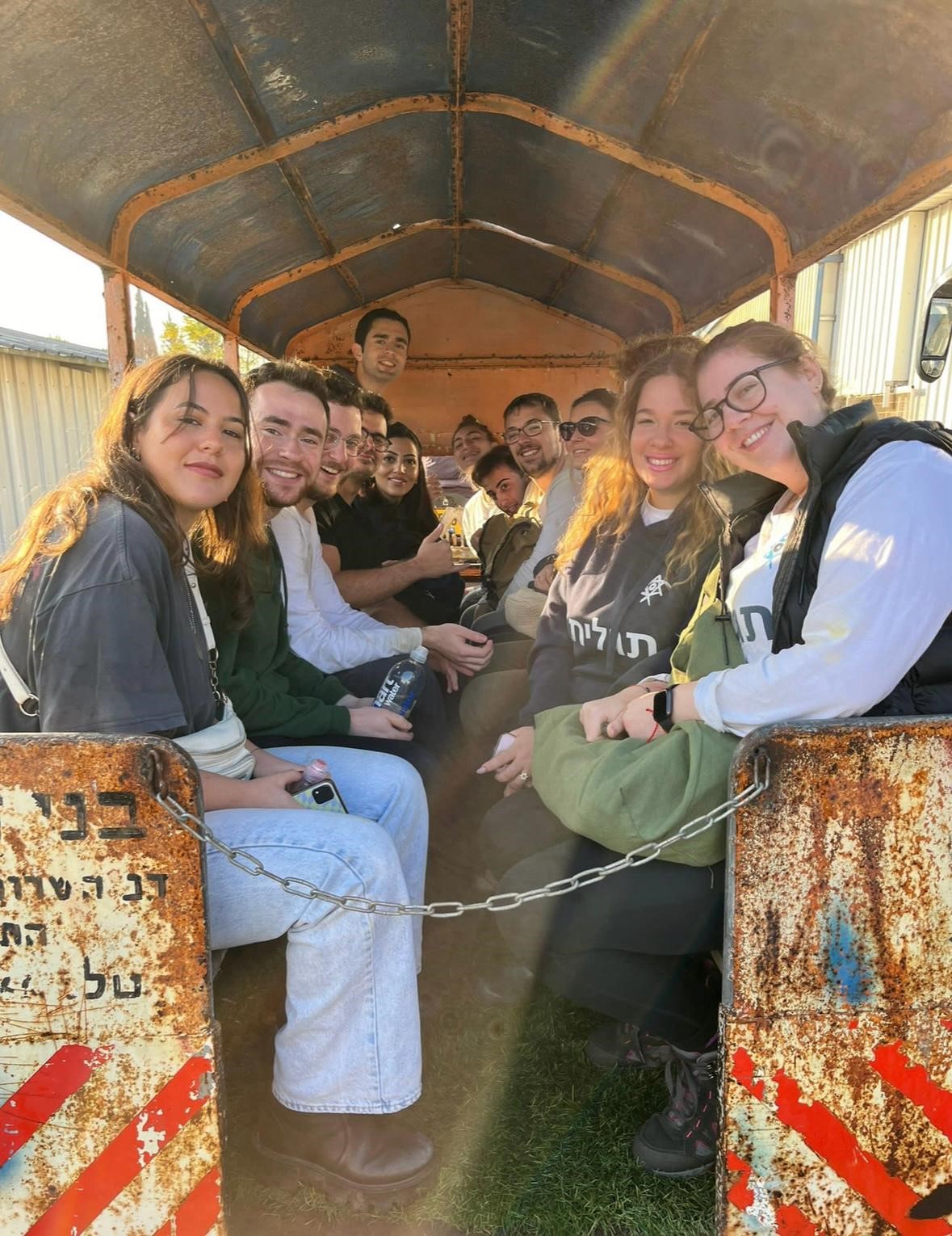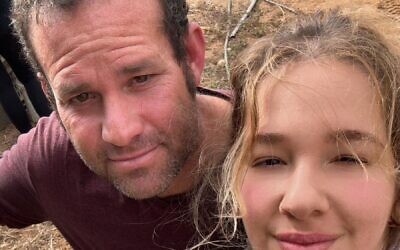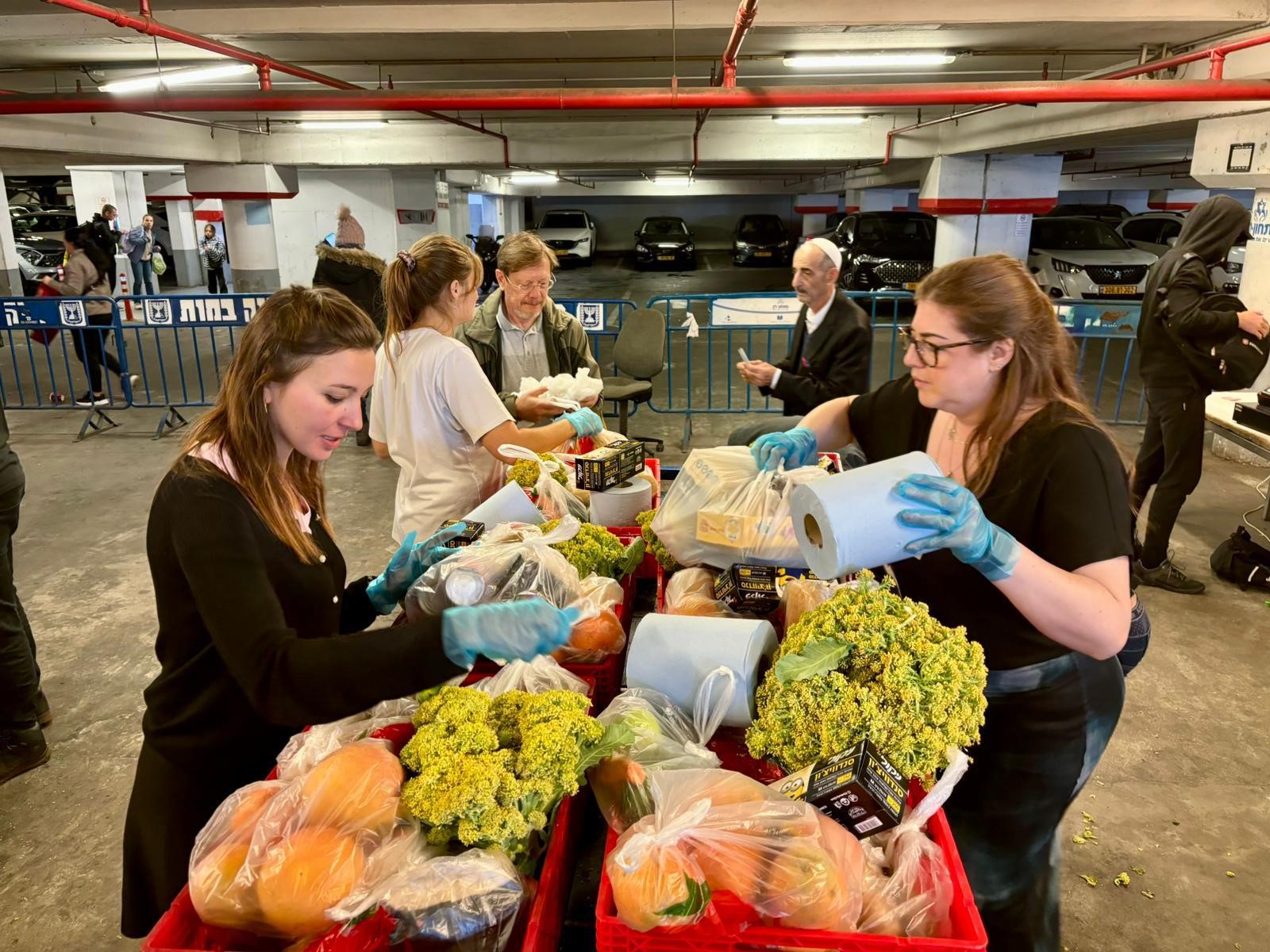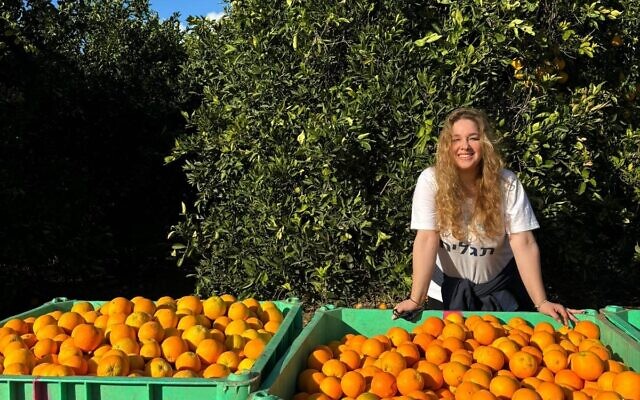Why picking oranges in Israel is so much more than it seems
Volunteer programmes are helping rebuild the economy - and the soul
Naomi is a freelance features writer
“Don’t worry about the thorns,” says Roeii, a farmer in Moshav Bnei Dror, as I prick myself reaching for an orange. “We Israelis deal with thorns all the time, but nu, we carry on.”
This poignant statement set the tone for a meaningful two-weeks. Taglit (Birthright) is a rite of passage for young Jews, but I had never been on one. At 31 I thought my time had passed to take part on one of these trips, however, when I saw the special Onwards Israel volunteer program advertised for Brits aged 18-40 to help rebuild the economy, I knew I had to join.
My friend Shira and I joined a group of 15. Led by our energetic madricha Sophie, we embraced early starts and a packed itinerary with snacks, initiative and good cheer. Our volunteering included essential agricultural work because, due to the war, migrant workers from Thailand and the Philippines have returned home and Palestinian workers are unable to work in Israel.
As the days passed, a surge of nationalistic pride enveloped us, akin to following in the footsteps of the Zionists of old – clambering up leafy trees in to pick heaps of succulent oranges in the sunshine, amidst banter and music. We also assisted organisation Pitchon Lev, contributing to logistics and packing food for soldiers and families. The satisfaction of feeding 652 people and witnessing them collect the goods was gratifying.

The Spot Hostel near Tel Aviv port, our home for two weeks, was vibrant and welcoming, with hipster vibes and an eclectic young crowd. Our group seamlessly integrated with Israelis staying there, who revealed that they often spot Quentin Tarentino in the lobby. Eliav, 24, who joined us for Shabbat lunch, shared that he’s a survivor of the Nova massacre and had come here for the last month to rest and recuperate. He luckily managed to escape in his car as soon as he heard the sirens but sadly lost a friend who was killed by a grenade thrown into the shelter by the Hamas terrorists.
Hearing stories like this first-hand from survivors was particularly impactful, as was the temporary Nova exhibition our group visited at the Tel Aviv Expo. Featuring items from victims of the massacre as well as relics from the festival itself such as portaloos riddled with bullets, the sombre atmosphere was amplified by the low background music that was played at the festival on that fateful day. We all agreed it was akin to an eerie ‘living Auschwitz’ memorial, with all the shoes of the victims similarly lined up.

Today’s Tel Aviv is quiet, and everywhere we went we were surrounded by the faces of the hostages and signs urging their return. We gained an updated perspective on Israeli society and culture through a graffiti tour led by local Dada Strauss. Together we explored the colourful streets of Florentine (aka Tel Aviv’s Shoreditch), where we marvelled at the magnificent wall art, a project of Free Our Kids IL that has been created for each child hostage in Gaza (wallsofhope.net). Dada explained that the artists had been in close contact with the families to make the art as personal as possible.
Dada revealed that “‘people in Tel Aviv are not so left-wing anymore – we are more central now”. Nothing was as representative of this as a chance meeting during the tour itself, when we happened upon Israeli artist John Kiss, who had drawn a mural called The Peace Kids depicting Handala, a Palestinian and Srulik, an Israeli with their arms wrapped around each other, looking at the horizon.

He says that to him this had initially represented “optimism, hope and peace”, however, since October 7th “I had painted the exact same mural but this time the Palestinian has a bloody knife stabbed in the Israeli back he is hugging”. I voiced that this echoed my personal feelings towards the conflict and scepticism about the possibility of peace with those who actively seek our genocide.
Many Arab Israelis are part of the fabric of Israeli society, like Riyad, our friendly Arab Israeli driver from the city of Taiba, who joined us picking oranges. A journalist and social, political and media activist, Riyad now drives buses for the war effort, including accompanying soldiers into Gaza. In a candid chat, he relayed to us that “every time I heard about these young soldiers dying my heart broke. I loved them and they loved me”.
His relatives and friends also volunteer towards the war effort. “October 7 affected everyone in Israel – it’s a war against all of us. But Palestinians see us as Jews and Jews see us as terrorists. This is something very difficult for us to deal with,” he said.
 Still, hope in continued co-existence was very much seen and felt throughout our stay. We toured the orange factory in Bnei Dror and witnessed Arabs and Jews working together in harmony. Our local bakery, Abulafiah, run almost exclusively by Arab workers, was the go-to for our 6am daily coffee and sambusak pastries. On our last day, they sent freshly-baked cakes for our flight home, along with a message of love and thanks for volunteering and helping Israel.
Still, hope in continued co-existence was very much seen and felt throughout our stay. We toured the orange factory in Bnei Dror and witnessed Arabs and Jews working together in harmony. Our local bakery, Abulafiah, run almost exclusively by Arab workers, was the go-to for our 6am daily coffee and sambusak pastries. On our last day, they sent freshly-baked cakes for our flight home, along with a message of love and thanks for volunteering and helping Israel.
This appreciation was echoed by Roeii and Forte, the manager of the orange grove. Roeii teared up when we said goodbye, telling us that his Arab-Israeli workers were surprised and touched that Jews came from abroad to help.
“It’s a shared fight,” said Shira. “They are us and we are them.”
Birthright is running trips until April birthrightisrael.com/volunteer-in-israel

Thank you for helping to make Jewish News the leading source of news and opinion for the UK Jewish community. Today we're asking for your invaluable help to continue putting our community first in everything we do.
For as little as £5 a month you can help sustain the vital work we do in celebrating and standing up for Jewish life in Britain.
Jewish News holds our community together and keeps us connected. Like a synagogue, it’s where people turn to feel part of something bigger. It also proudly shows the rest of Britain the vibrancy and rich culture of modern Jewish life.
You can make a quick and easy one-off or monthly contribution of £5, £10, £20 or any other sum you’re comfortable with.
100% of your donation will help us continue celebrating our community, in all its dynamic diversity...
Engaging
Being a community platform means so much more than producing a newspaper and website. One of our proudest roles is media partnering with our invaluable charities to amplify the outstanding work they do to help us all.
Celebrating
There’s no shortage of oys in the world but Jewish News takes every opportunity to celebrate the joys too, through projects like Night of Heroes, 40 Under 40 and other compelling countdowns that make the community kvell with pride.
Pioneering
In the first collaboration between media outlets from different faiths, Jewish News worked with British Muslim TV and Church Times to produce a list of young activists leading the way on interfaith understanding.
Campaigning
Royal Mail issued a stamp honouring Holocaust hero Sir Nicholas Winton after a Jewish News campaign attracted more than 100,000 backers. Jewish Newsalso produces special editions of the paper highlighting pressing issues including mental health and Holocaust remembrance.
Easy access
In an age when news is readily accessible, Jewish News provides high-quality content free online and offline, removing any financial barriers to connecting people.
Voice of our community to wider society
The Jewish News team regularly appears on TV, radio and on the pages of the national press to comment on stories about the Jewish community. Easy access to the paper on the streets of London also means Jewish News provides an invaluable window into the community for the country at large.
We hope you agree all this is worth preserving.






















